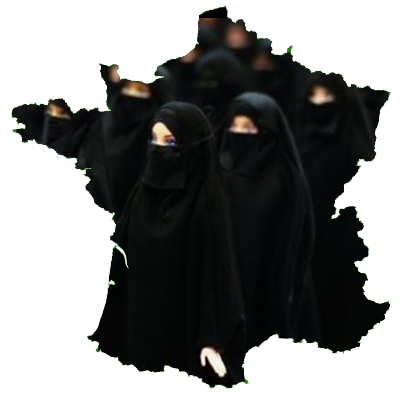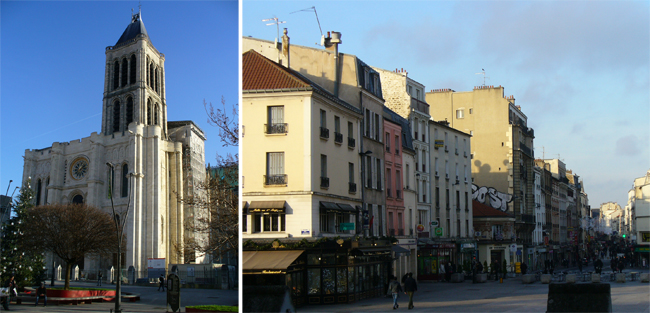
Reflections on Vancouver, British Columbia and other topics, related or not
As willed by Allah
and the Western elites
France surrenders to Islam, but not through war
or terrorism, in Michel Houellebecq’s novel Submission
June 28, 2017
The opportunists went along with it, naturally. Desperate for power, the politicians of the not-quite-majority socialist and much smaller conservative parties united under Muslim leadership in a coalition rationalized as Anything But Le Pen. The hard-left soixante-huitards couldn’t bring themselves to criticize non-whites. The feckless and clueless media remained feckless and clueless.
Institutions transformed immediately. In academia, the dimmer careerists enthusiastically accepted three-fold pay raises and four-fold, much-younger wives. But even some of France’s most highly learned intellectuals enlisted, one by one, embracing Islam to resuscitate dead lives. Such was the way France surrendered, the first of a number of European countries to join the burgeoning Eurabia under Islam’s quest for world domination. That’s the scenario in Michel Houellebecq’s novel Submission.
The conversions among France’s upper-middle class (bourgeois and lower classes rate little mention in this story) might reflect a spiritual journey, capitulation or desire for a dick-pleasing nirvana. It’s a male-only elite. Females get lots of social conditioning but little education before being packed off, often in their early teens, in arranged marriages to satisfy much older polygamist husbands and raise another generation of Muslims. Men who lack affluence live in poverty, generally without women. Islamic doctrine excuses all of that, according to Submission’s eloquent convert-proselytizer Robert Rediger. Oh, and the elite get plenty of booze too, all top-quality stuff.
The new France comes about not so much by war or terrorism but by liberal values, leftist agitation, political ambition and personal opportunism—not to mention some clever Frankfurt School-type Muslim undermining of important institutions.
Although apolitical, Houellebecq’s character Francois had recognized long before the Muslim takeover “that the widening gap, now a chasm, between the people and those who claimed to speak for them, the politicians and journalists, would necessarily lead to a situation that was chaotic, violent and unpredictable.”
Poor, tormented Francois went stale as a young man, as soon as he finished his seven-year, 788-page study of the 19th-century writer Joris-Karl Huysmans. Unable to love, the prestigious prof satisfies his dick (a frequently mentioned, almost separate character in the novel) with a different student each academic year. He loses his last outlet (seemingly his final, now that the Sorbonne has fired him and all the other infidel teachers) when the secular Jew flees to Israel.
As a talented but dissipated intellectual, Francois swings both ways while trying to salve his tiresomely troubled soul, patronizing expensive hookers and seeking spiritual solace. Affluent, apathetic, hedonistic, directionless and at times suicidal, he personifies the West. Both he and his society constitute prime candidates for some kind of regeneration. In a scene slightly reminiscent of Winston’s first formal meeting with Inner Party bigshot O’Brien in 1984, Rediger describes how he joined up on Easter Monday.
Francois did at times find transcendence in art: “Only literature can grant you access to a spirit from beyond the grave—a more direct, more complete, deeper access than you’d have in conversation with a friend.” But he’s normally ruled by his carnal side. At the abbey where Huysmans took monastic vows, Francois abandons his spiritual retreat, pissed off that he can’t smoke in his room. At the legendary sanctuary of the Virgin of Rocamadour, he seems to undergo a spiritual experience, then dismisses it as the result of hunger. As Rediger talks of Europe’s rapid decline after its 19th century apogee, Francois can only bemoan the likelihood that casualties included forgotten sexual techniques.
In some respects, Houellebecq’s own view of society’s natural order complements Islam. He has Francois questioning women’s post-1960s roles, but the author states his case most strongly in his portrayal of Marie-Francoise. Another very recently fired Sorbonne academic, she enthusiastically and single-handedly prepares a massive gourmet feast while wearing an apron emblazoned with: “Don’t Holler at the Cook—That’s the Boss’s Job!” Meanwhile her husband and Francois—the men—discuss affairs of state, history, literature and spirituality.
Rediger sounds sincere as he expounds the case for Intelligent Design, points to the death of the West and argues against Christianity. But in his key sales pitch to Francois, Rediger explains that they’re both members of an elite who’ll benefit from officially mandated income disparity and up to four much-younger wives of guaranteed beauty. “I can promise, you’d have nothing to complain about.”
Europe’s just the start. Rediger even suggests a timeline for the submission of China and India, already so crippled by Western influences as to be inevitable conquests.
Cynics not living in countries blessed by anti-Islamophobia laws might ask how Rediger and Francois can spend so much time discussing the coming Islamic conquest without noting one or two shortcomings of Islamic civilization, where it exists, or the irony of Muslim influence being furthered by Muslims who fled Muslim countries in desperation for non-Muslim countries.
As for Islam’s French intellectual converts, Islam allows them to French intellectualize to their French intellectualized hearts’ content as long as their French intellectualizing remains French intellectually irrelevant to anything that matters—in other words, Islam. Towards the end of the story potential convert Francois experiences a French intellectual epiphany. His musings about Islam combined with his preoccupation with carnality suddenly convince him that he now understands Huysmans “completely, better than he had understood himself.” Francois then writes his master work, the preface to a study of Huysmans’ use of neologisms versus archaic diction.
So maybe it’s just as well that Canada has almost nothing in the way of intellectuals. But in any field of endeavour our elites, stupendously shallow and complacent, are every bit as self-serving as those in Submission. Their Welcome Home enthusiasm threatens to bring on another multicultural dystopia, something like that envisioned by another French writer, Jean Raspail, in his 1973 novel The Camp of the Saints.

